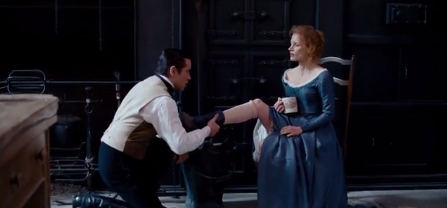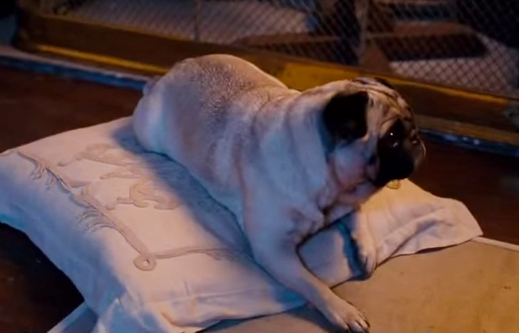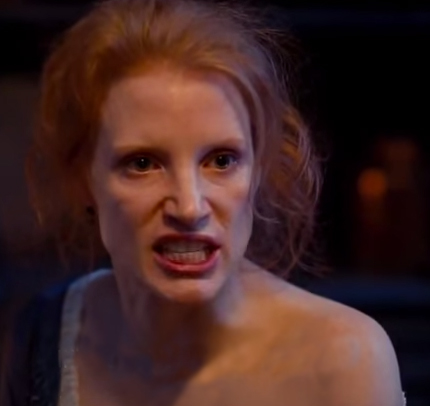The 2014 edition of TIFF ends tonight and so will Nathaniel's review coverage with Still Alice. Wrap-ups and Oscar updates coming shortly thereafter. Now Liv Ullman's Miss Julie...
 "Kiss my shoe!" Colin Farrell reenacts critical reaction to Chastain's debut film year
"Kiss my shoe!" Colin Farrell reenacts critical reaction to Chastain's debut film year
This review contains 126 year-old spoilers if you’re not familiar with August Strindbergh’s one act play, which has been adapted to film frequently. The play is about the bored, lonely, and loveless daughter of a Baron, Miss Julie (Jessica Chastain) who enjoys toying with the servants, especially with John her father's valet (Colin Farrell). She flirts shamelessly even in front of his fiancé the cook (Samantha Morton) ordering him to perform sometimes demeaning and not very valet-like duties, like kissing her shoe or bringing her flowers. The story takes place in a single night in which the valet and the lady of the house will consummate their extremely uncomfortable and scandalous attraction with incredibly disastrous results... especially for Miss Julie. If 19th century Swedish country estates had been unionized John surely would have told her what wasn't in his job description. 'Not that. Not that. Definitely not that. You're playing with fire, Miss Julie!'
We understand Miss Julie's maddening hypocrisies straightaway as, when the story begins, she's already ordered the cook to feed her dog "Diana" an abortive dinner since the naughty girl has had sex with the gate keeper's mongrel dog. Foreshadowing 101 anyone? Diana is played by an adorable pug so we'll ignore, for Jess's dignity, that the play indicates that the dog ought to resemble Miss Julie! The pug laps down the meal hungrily and then proceeds to whimper through the entire first scene. This too proves foreshadowing, as yours truly began to do the same. If only Samantha Morton could have scooped me up, as she mercifully does with the confused pup, to carry me out of the screening room!
 Diana, the pug. "A whore is a whore!"
Diana, the pug. "A whore is a whore!"
Onstage Miss Julie can be performed in well under two hours. Most feature versions, excluding silent films, from the earliest in 1951 (Swedish) to the most recent previous adaptation in 2013 (also Swedish) last about 90 minutes. Strangely this new Liv Ulllman film takes 129 minutes to tell the story. I can't imagine why this is since I can only immediately identify two scenes of padding, those unnecessary literalizing bookends (not from the play), wherein we see Miss Julie as a young girl visits the set of Cries and Whispers to kneel prostrate over her bed and cry for her dead mother and Miss Julie's actual suicide, which is only suggested to occur directly after the play ends after the hopefully still living actress -- you never know, it's a tough part! -- has taken her last bow.
 "Don't speak harshly to me!" Sorry, Jess. I STILL LOVE YOU.Visually, this new version is so straightforward that the most memorable images come from those colorful literal bookends. The rest of the imagery amounts to a series of two and three shots, few of them interesting in their configurations of the trio of characters, mixed with abundant unbroken closeups (of which I am normally a huge fan) of the three stars acting their heads off. Call it Acting: The Movie! since that’s what it amounts to. Singular short clips of any of these performances could conceivably look impressive out of context but as a two hour drama, which all takes place over the course of one night, the modulation is strangely off in that there barely is any. This is altogether confusing since the film is directed by one of the all time great screen actors Liv Ullman, and no one with any sense would call Jessica Chastain, Samantha Morton, or Colin Farrell amateur thespians. But here we have it. Though little moments in the performances work, and the actors aren't at all lazy about their work, it's all just too intense and hysterical too quickly when it needs to build towards the break-downs, escape plans, and death wishes.
"Don't speak harshly to me!" Sorry, Jess. I STILL LOVE YOU.Visually, this new version is so straightforward that the most memorable images come from those colorful literal bookends. The rest of the imagery amounts to a series of two and three shots, few of them interesting in their configurations of the trio of characters, mixed with abundant unbroken closeups (of which I am normally a huge fan) of the three stars acting their heads off. Call it Acting: The Movie! since that’s what it amounts to. Singular short clips of any of these performances could conceivably look impressive out of context but as a two hour drama, which all takes place over the course of one night, the modulation is strangely off in that there barely is any. This is altogether confusing since the film is directed by one of the all time great screen actors Liv Ullman, and no one with any sense would call Jessica Chastain, Samantha Morton, or Colin Farrell amateur thespians. But here we have it. Though little moments in the performances work, and the actors aren't at all lazy about their work, it's all just too intense and hysterical too quickly when it needs to build towards the break-downs, escape plans, and death wishes.
In the final section, the wee hours of the morning after this crazy sleepless night, Miss Julie’s voice suddenly (and understandably) becomes hoarse which would be a nice touch but why does it happen in the middle of a scene? Were different days of shooting spliced together? More troubling are the weirdly anachronistic line readings that flare up occasionally in all three performances.
But then anachronisms are often a problem when old texts aren't rethought or transposed cleverly to new time periods and settings. Strindberg's classic, originally meant to symbolize Darwinism and the death of the aristocracy, is difficult to take now in this new aristocratic age of the 1% and the result is that some of this symbolism slips away and leaves quite a void behind. What we're left with without that historical economic context with its societal mores is a misogynistic fable in which a woman having sex beneath her class and before she's married means that she'd be better off dead.
 Oh great, now she's RUINED!
Oh great, now she's RUINED!
The actors might have conceivably rescued this movie from its misguided conception, but it’s a very strangely acted movie, all declamatory and totally exhausting. But there's no mistaking that it's ACTED! Even the parakeet overdoes it in her death scene - blame the animatronic double if you must. (No animals were harmed in the making of this picture, I checked in the credits.) The truest moment then is a long closeup of Jessica Chastain post-nervous breakdown wherein her neck seems barely able to support her head, having acted it off, and says...
I'm so tired."
The most unfortunate take away is that the most all around successful performance comes from Diana the pug, the only actor who remembers to just "be" her character rather than acting it. C-